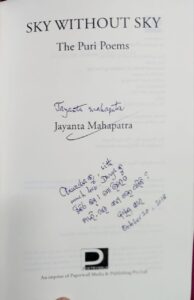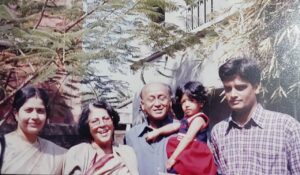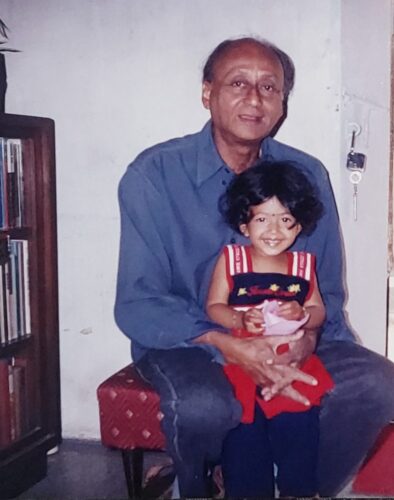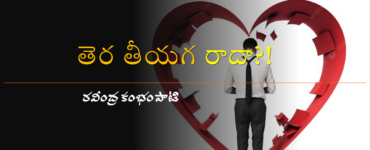Meeting a great poet in person is a rare and cherished experience, one that becomes even more meaningful when there is a personal connection. I have had the privilege of meeting Jayanta Mahapatra not once, but thrice.
When I met Jayanta Sir for the first time, I was just one and half years old. I, along with my father and mother visited his residence in Cuttack. He gently held me and played with me for some time. At that time I hardly knew about his eminence as a poet.
The second meeting was rather a brief one when he came to Sambalpur for a literary event.
In October 2018, I met him for the third and last time. I, along with my father went to Chandrabhaga, Tinkonia Bagicha. Jayanta Sir, in his early ninties, greeted us with a warm hug.
 When he got to know that I am a science student, he recalled his days as a physics professor and clarified my concepts about focal length and mirrors. Apart from that, he also reminisced his youthful days when he fell in love with literature. His conceptions about life, human experiences gave me an entirely new perspective. During that chat, I learned that he was a highly curious, knowledgeable man with deep intelligence and sensitivity towards emotions.
When he got to know that I am a science student, he recalled his days as a physics professor and clarified my concepts about focal length and mirrors. Apart from that, he also reminisced his youthful days when he fell in love with literature. His conceptions about life, human experiences gave me an entirely new perspective. During that chat, I learned that he was a highly curious, knowledgeable man with deep intelligence and sensitivity towards emotions.
He gifted me his latest poetry book “Sky without sky” saying “this old man could not give you anything except this” not knowing what a lot he had given me apart from that book. The very fact of interacting with a genius like him will keep enriching me for the rest of my life. I can never forget the love and affection he gave me.
My father and Jayanta sir shared a close and creative bonding of more than three decades. I have seen my father working with passion and dedication when the central Sahitya Akademi assigned him to edit a volume on Jayanta Sir’s life and works.
Jayanta Sir’s poems were a reflection of his inner world, one filled with both pain and beauty. His verses resonated with readers because of their ability to convey the complexities of human emotions. His poems explored themes of love, loss, nature, and the passage of time, weaving together words with a rare elegance.
He emphasized the importance of understanding the human experience and translating it into words that could touch the hearts of readers. My father often spoke of the profound impact Jayanta Sir had on his growth as a writer and, more importantly, as a human being.
He had an uncanny ability to observe the world around him, to understand the joy and sorrows of nature, and to translate these into verses that evoked a sense of wonder and introspection.
Amidst the brilliance of his poetry, there was one deeply personal regret that haunted Jayanta Mahapatra throughout his life. It was the sorrow of not having a daughter of his own. Despite the literary acclaim and recognition, this void in his life remained unfulfilled. He wrote a poem called “Na thiba jhia ti mora” which has been translated into Bengali by Owshnik Ghosh and I am privileged to be a part of this collaborative translation.
Jayanta Mahapatra, the poet, and mentor, may have faced his share of sadness, but his legacy is one of beauty, compassion, and the profound ability of words to transcend the limitations of time and space. Although he is not there with us today, his poems remain awe-inspiring, intense, and thoughtful.
The poem “JAYANTA MAHAPATRA” by Jayanta Mahapatra is quite a prophetic one and he wished this poem to be translated. I hope I have done justice to the poem and the poet.

JAYANTA MAHAPATRA
—– Jayanta Mahapatra
I will complete ninety-five
on the eighth day of next ‘Ashwin’.
Also, I might not.
Friend, aren’t you able to see me?
I live inside this broken body of mine,
in the confines of whose silence nobody can touch me.
For whom do I weep falsely?
For whom do I laugh falsely?
My friend, do you even know that I write?
That’s it. I just couldn’t extricate myself from it.
I eat curd and water rice with puffed white lentils
and write poetry in summer, mostly in English.
Wrapping around my waist a Khordha gamcha
Is so comforting to me.
When I come out of the house at dawn,
tiny droplets of water fall from the bamboo tree.
I keep wondering, if these droplets
are these its tears?
Do I know that sadness had built its home
even inside the bamboo leaves?
Do I even know
for whom I lost everything of me
for whom I wept all day and night,
Was longing like a faraway sea
Who was loving me secretly
with her invisible, dark pair of eyes??
*









Heart touching tribute
A well crafted write up Annwesha.
What I like most of Anwesha is her language so simple and lucid that one can drink it like water in one stroke.
My wishes and blessings are with her all fields of life. God bless you dear Anwesha.